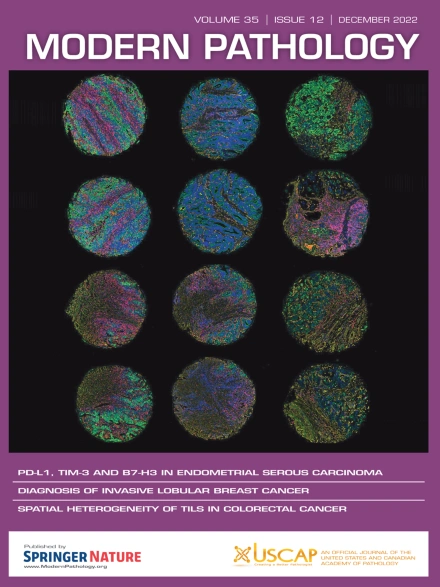POU4F3 是梅克尔细胞癌敏感而特异的标记物
IF 7.1
1区 医学
Q1 PATHOLOGY
引用次数: 0
摘要
梅克尔细胞癌(Merkel cell carcinoma,MCC)虽然具有重要的治疗意义,但目前还没有一种灵敏而特异的免疫印迹可用于区分梅克尔细胞癌(MCC)和拟态梅克尔细胞癌(MCC)。此外,前哨淋巴结活检也很难检测到单个肿瘤细胞。利用公开的 9264 个实体瘤数据集和超过 60 万个单细胞转录组,我们发现 POU4F3 是 MCC 的特异性标记物。对来自肿瘤癌症基因组图谱(TCGA)数据集以及非TCGA SCLC和MCC数据集的24种肿瘤类型的泛癌症RNA批量测序数据的分析证实了POU4F3对MCC的特异性。单细胞 RNA 测序分析也证实肺小细胞癌和各种正常组织中缺乏 POU4F3 表达。在153例MCC中,98.7%有核POU4F3免疫组化表达,只有1.7%的拟态MCC(180例中有3例,包括95例小细胞癌,其中55例来自肺部,其余来自其他部位)有核POU4F3免疫组化表达。3例POU4F3阳性的非MCC病例分别来自肺部(2例)和阴道(1例)。所有153例接受检测的MCC病例的ASCL1均为阴性,而ASCL1是一种在SCLC中高度表达的关键转录调节因子。NeuroD1可见于一部分MCC病例(20.9%,32/153)。对29个前哨淋巴结进行了POU4F3免疫染色,即使是单个肿瘤细胞,POU4F3的强核表达也有助于转移瘤的检测。我们的研究在先前研究的基础上表明,POU4F3是MCC的一个敏感而特异的临床标记物。本文章由计算机程序翻译,如有差异,请以英文原文为准。
POU4F3 Is a Sensitive and Specific Marker of Merkel Cell Carcinoma
Although of therapeutic importance, a single sensitive and specific immunostain to distinguish Merkel cell carcinoma (MCC) from mimics is not currently available. In addition, single tumor cells are difficult to detect in sentinel lymph node biopsy. Leveraging publicly available data sets of 9264 solid tumors and >600,000 single-cell transcriptomes, we identified POU4F3 to be a specific marker of MCC. Analyses of Pan-Cancer RNA bulk sequencing data of 24 tumor types from Tumor Cancer Genomic Atlas data sets as well as non-Tumor Cancer Genomic Atlas small cell lung carcinoma and MCC data sets confirmed POU4F3 specificity for MCC. Single-cell RNA-sequencing analyses also confirmed the lack of POU4F3 expression in lung small cell carcinoma as well as a variety of normal tissues. Nuclear POU4F3 immunohistochemical expression was noted in 98.7% of 153 MCCs and in only 1.7% of mimics (3 of 180 cases, including 95 small cell carcinomas, of which 55 were from lungs and the remainder from other sites). Three POU4F3-positive non-MCC cases were from lungs (2 cases) and vagina (1 case). All 153 tested MCC cases were negative for ASCL1, a key transcriptional regulator highly expressed in small cell lung carcinoma. NeuroD1 was seen in a subset of MCC cases (20.9%, 32/153). POU4F3 immunostain was performed on 29 sentinel lymph nodes, and strong POU4F3 nuclear expression facilitated the ease of metastasis detection, even single tumor cells. Our study built on prior works shows that POU4F3 is a sensitive and specific clinical marker of MCC.
求助全文
通过发布文献求助,成功后即可免费获取论文全文。
去求助
来源期刊

Modern Pathology
医学-病理学
CiteScore
14.30
自引率
2.70%
发文量
174
审稿时长
18 days
期刊介绍:
Modern Pathology, an international journal under the ownership of The United States & Canadian Academy of Pathology (USCAP), serves as an authoritative platform for publishing top-tier clinical and translational research studies in pathology.
Original manuscripts are the primary focus of Modern Pathology, complemented by impactful editorials, reviews, and practice guidelines covering all facets of precision diagnostics in human pathology. The journal's scope includes advancements in molecular diagnostics and genomic classifications of diseases, breakthroughs in immune-oncology, computational science, applied bioinformatics, and digital pathology.
 求助内容:
求助内容: 应助结果提醒方式:
应助结果提醒方式:


